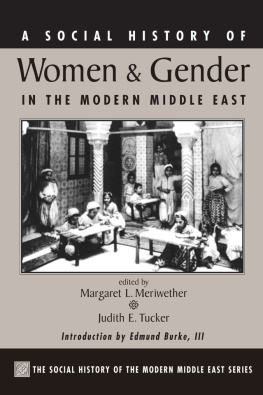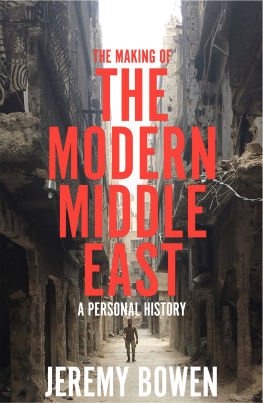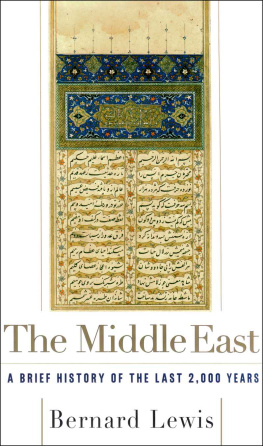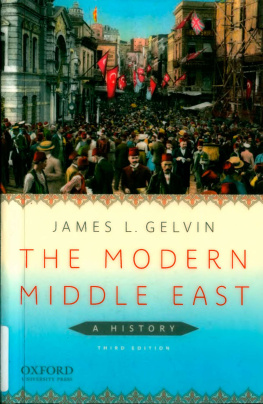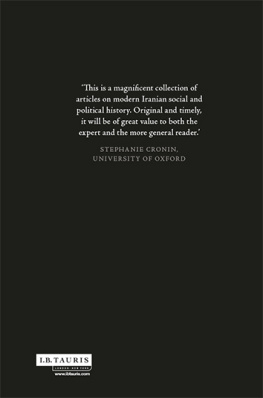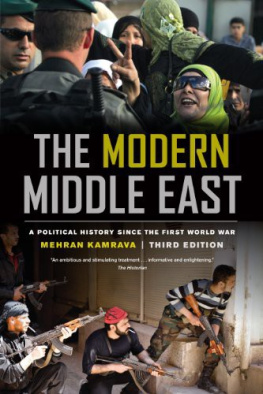Social History of Women and Gender in the Modern Middle East
The Social History of the Modern Middle East
Series Editor: Edmund Burke III
This series seeks to provide a forum for historically grounded studies on the Middle East in a broad, interdisciplinary context. New research has challenged tacit acceptance about how the Middle East came to modernity and has enlarged our understanding of the complex changes in the region over time and their impact on people and popular culture. By focusing on the nuances of everyday life and the experiences of noneliteswomen, workers, peasants, and minoritiesstereotypes about what it means to be Arab and Islamic can be challenged and broken down. Far from being a "history with the politics left out," a social history of the Middle East provides a way of reinterpreting the political history of the region, including the development of nationalism and the so-called Islamic revival.
BOOKS IN THIS SERIES
A Social History of Women and Gender in the Modern Middle East, edited by Margaret L. Meriwether and Judith E. Tucker
The Social History of Labor in the Middle East, edited by Ellis Jay Goldberg
FORTHCOMING
The Social History of Class in the Middle East, edited by Peter Sluglett
Social History of Women and Gender in the Modern Middle East
edited by
Margaret L. Meriwether Judith E. Tucker
The Social History of the Modern Middle East
First published 1999 by Westview Press
Published 2018 by Routledge
711 Third Avenue, New York, NY 10017, USA
2 Park Square, Milton Park, Abingdon, Oxon OX14 4RN
Routledge is an imprint of the Taylor & Francis Group, an informa business
Copyright 1999 Taylor & Francis
All rights reserved. No part of this book may be reprinted or reproduced or utilised in any form or by any electronic, mechanical, or other means, now known or hereafter invented, including photocopying and recording, or in any information storage or retrieval system, without permission in writing from the publishers.
Notice:
Product or corporate names may be trademarks or registered trademarks, and are used only for identification and explanation without intent to infringe.
Library of Congress Cataloging-in-Publication Data
Social history of women and gender in the modern Middle East / edited
by Margaret L. Meriwether, Judith E. Tucker.
p. cm. (Social history of the modern Middle East)
Includes bibliographical references and index.
ISBN 0-8133-2100-X (hardcover). ISBN 0-8133-2101-8
(pbk.)
1. WomenMiddle EastHistory. 2. WomenMiddle EastSocial
conditions. 3. Sex roleMiddle EastHistory. 4. FeminismMiddle
East. I. Meriwether, Margaret L. II. Tucker, Judith E.
III. Series.
HQ1726.5.S63 1999
305.4'0956dc21 99-17105
CIP
ISBN 13: 978-0-8133-2101-1 (pbk)
Contents
, Edmund Burke, III
, Margaret L. Meriwether and Judith E. Tucker
, Julia Clancy-Smith
, Mervat F. Hatem
, Ellen L. Fleischmann
, Annelies Moors
, Mary Elaine Hegland
O ver the past decades, important new perspectives on the modern Middle East have emerged due to new sources and new questions as well as the changing historical context. Old paradigms, rooted in modernization theory and the rise of nationalism in the region, are gradually giving way to more complex understandings grounded in social and cultural history. From a field preoccupied with the state and elite groups, recent studies of the Middle East have begun to incorporate the experiences of nonelite women, workers, peasants, ethnic minorities, and tribespeople. While this evolution is still continuing, already the outlines of a new social history of the region are visible.
In this moment of intellectual transition, a series devoted to the social history of the Middle East has much to contribute. The Westview Press series The Social History of the Modern Middle East seeks to provide a focus for historically grounded social science research on the Middle East. Rather than seeing in narrow disciplinary terms, this series views the region using a broad interdisciplinary space within the social sciences, a zone of convergence between anthropology, politics, sociology, women's studies, and history. It seeks to stimulate and focus methodological reflection and scholarship on topics of importance to the Middle Eastern field and to make more widely available the work of a new generation of researchers. Books in the series are designed to supplement courses at the upper division and graduate levels not only in modern Middle Eastern history, but also in anthropology, politics, sociology, and women's studies.
Research on the social history of the Middle East since 1750 has tended to proceed unevenly across the region, with scholars who focus on similar topics in different countries often unaware of one another's work. Work on the Middle East has also been relatively poorly integrated into broader trends affecting the disciplines of the Middle East field. Several reasons may be adduced in explanation. In part, the particular linguistic demands of the field have encouraged specialization in one cultural area or even one country. In addition, scholarly debates tend to take place in hard-to-find specialized journals, and their findings are slow to make their way into the mainstream. As a result, new research on workers, women and the family, and urbanism has been slow to find its way into textbooks.
To facilitate the wider dissemination of new work on Middle Eastern culture and society, volumes in the Social History of the Modern Middle East series will draw together work that crosses disciplinary lines and subregional traditions of scholarship. Under the general editorship of Edmund Burke, III (Professor of History at the University of California, Santa Cruz), volumes have been commissioned on the social history of labor, women and the family, and Middle Eastern urbanism. Others are under consideration. Edited by established scholars, each book will consist of six to nine original essays that will allow readers to follow recent findings on particular topics. Books will survey the region broadly, from the Maghrib to the Hindu Rush; Each will contain chapters on Turkey, Egypt, and Iran, the three most populous states in the region; coverage of other states will vary, depending upon the availability of scholarship. All are works of original scholarship that demonstrate the value of particular approaches as well as provide convenient summaries of the state of research on important topics.
Although the study of women and gender in the Middle East emerged in the 1980s as a major area of research, the history of women has been slower to emerge. Inspired by feminism, the hidden history of women in the Middle East has come gradually to light. Utilizing new sources and asking new questions of old sources, historians of women have made notable contributions to the history of women and the family in the Middle East. In the process they have had an important impact on how the social history of the region, previously resistant to the importance of gender, has been conceptualized. No longer is it possible to make blanket assumptions about the social, religious, political, and economic roles of women. Increasingly, the new research has exposed the ways in which women's fates, even while constrained by a common patriarchal framework, differed from one another according to their ethnic, religious, and social backgrounds (among others). The second volume in this series, The Social History of Women and Gender in the Modern Middle East, co-edited by Margaret L. Meriwether and Judith E. Tucker, provides a broad survey of recent work on the subject.


